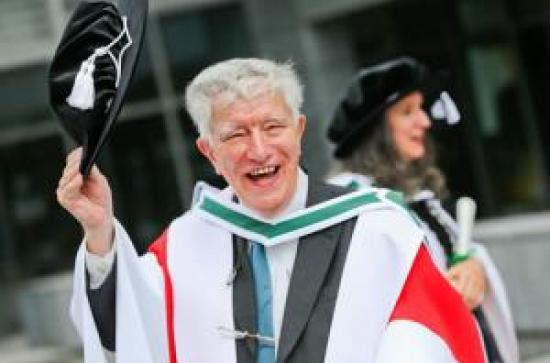
Professor George Leonard Huxley
George Leonard Huxley was born in England in 1932, the son of Leonard and Molly Huxley. He attended Magdalen College, Oxford, where he graduated in Literae Humaniores in 1955 and from then until 1961 he was a Fellow of All Souls College, Oxford. During this period, he was appointed Assistant Director of the British School in Athens for two years. Thus began a love affair with Greece where he excavated at both Knossos and Kythera. He met his wife, the archaeologist Davina Best while excavating on Crete and they married in 1957. Davina predeceased George in 2020. He is survived by his sister, Margo, and the Huxley’s three children, Harriet, Sophia, and Corinna.
In 1962 Professor Huxley was appointed to the Chair of Greek in Queen’s University, Belfast, which he held for over twenty years. And thus began his second love affair, with Ireland. In the early seventies he was a member of the executive of the Northern Ireland Civil Rights Movement, where, among other things, he lobbied for better housing for Catholics. He himself had become a convert to Catholicism at the age of twenty-one. Soon after his appointment at Queen’s he also co-founded the Hibernian Hellenists. This was a meeting of Classicists from north and south of the border, originally held at Ballymascalon, Dundalk, to facilitate ease for travel for both communities. These meetings would later move to Maynooth, becoming a major event in Irish scholarship. They ran for fifty years in an unbroken sequence and greatly helped put Irish scholarship on the map: for that alone, we are in Professor Huxley’s debt.
After leaving Queen’s in 1983 Professor Huxley returned, with his family, to a permanent address at Church Enstone in Oxfordshire but spent a great deal of his time travelling. He was twice visiting lecturer at Harvard University, also filling this role at the University of California in San Diego. But Ireland became his second home, and he worked tirelessly on promoting the Classics here. He was the main driver of an initiative, which has benefitted Irish universities greatly, that is the establishment of an Irish Institute of Hellenic Studies at Athens (IIHSA). Prior to this, our universities here had to shelter under the umbrella of the British School. It was he who established connections with the first funders and, also, secured support from the current President of Ireland, the then Minister for Arts and Culture, President Michael D. Higgins. It can truthfully be said that without his initiative the IIHSA would never have seen the light of day. Today students from the various Irish universities, get to travel to Greece to do fieldwork, and to research under the auspices of what is now a thriving Irish Institute of which we can be proud.
Professor Huxley was elected to membership of the Royal Irish Academy in 1971, acting as Secretary to the Polite Literature and Antiquities Committee from 1979-1986, and as Senior Vice-President in 1984-85 and again in 1999-2000. In 1984 he was chairman of the organising committee for the VIII International Congress of Classical Studies in Dublin. Other major commitments included his membership of the Irish National Committee for Greek and Latin Studies from 1972-86, 1991-99, acting as Chairman from 1976-1979. From 1986-1989 he was Director of the Gennadius Library at the American School of Classical Studies in Athens. In 1989 he became Honorary Professor of Greek at TCD, and he was also Honorary President of the Classical Association of Ireland in 1999. He held honorary degrees from Queens’, TCD and Maynooth. He would in time become an adjunct Professor in the departments of Classics and of Mathematics and Statistics at Maynooth University, to which he returned each year to deliver annual lectures until his late eighties. Always generous, he supported prizes at Maynooth in Classics and Mathematics, and in Patristics and Biblical Greek. He also donated substantial sums to the Russell Rare Book Library at Maynooth, which he often described as our best kept secret. His love affair with Ireland showed no signs of fading when in 2018 he became an Irish citizen, something of which I know he took great pride.
Professor Huxley was a world-renowned philologist and historian of the Ancient World. In a publishing career spanning over fifty years, he wrote hundreds of articles and reviews. His books include Achaeans and Hittites (1960); Early Sparta (1962); Early Ionians (1966), Greek Epic Poetry (1969), On Aristotle and Greek Society (1979), and Homer and the Travellers (1988). This prodigious output was justifiably rewarded by a Festschrift in the Hermathena journal of Classics at TCD in 2006. He was buried in the graveyard of St Kenelm’s Church beside his wife Davina at Church Enstone, a stone’s throw from Forge Cottage where he had lived. One old friend made the trip from Kythera, Greece, where Professor Huxley had been made an Honorary Freeman many years before, to place soil from there into his grave. He would have liked that. Requiescat in pace.
KMcG
